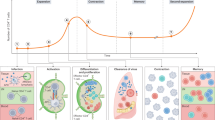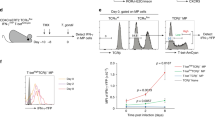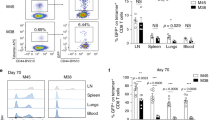Abstract
The mechanisms by which immunological memory is maintained after infection or vaccination are still a matter of debate. Long-term survival of memory T cells does not require major histocompatibility complex (MHC) contact. We show here that compared with memory CD4+ T cells that maintain contact with MHC class II, memory CD4+ T cells deprived of MHC class II contact show distinct functional defects upon antigen re-encounter. Thus, in contrast to their survival, maintenance of the typical quality of memory T cells crucially depends on MHC-derived signals.
This is a preview of subscription content, access via your institution
Access options
Subscribe to this journal
Receive 12 print issues and online access
$209.00 per year
only $17.42 per issue
Buy this article
- Purchase on Springer Link
- Instant access to full article PDF
Prices may be subject to local taxes which are calculated during checkout






Similar content being viewed by others
References
Sprent, J. T and B memory cells. Cell 76, 315–322 (1994).
Sprent, J. & Tough, D. F. Lymphocyte life-span and memory. Science 265, 1395–1400 (1994).
Gray, D. Immunological memory. Annu. Rev. Immunol. 11, 49–77 (1993).
Zinkernagel, R. M. et al. On immunological memory. Annu. Rev. Immunol. 14, 333–367 (1996).
Ahmed, R. & Gray, D. Immunological memory and protective immunity: understanding their relation. Science 272, 54–60 (1996).
Kundig, T. M. et al. On T cell memory: arguments for antigen dependence. Immunol. Rev. 150, 63–90 (1996).
Dutton, R. W., Bradley, L. M. & Swain, S. L. T cell memory. Annu. Rev. Immunol. 16, 201–223 (1998).
Murali-Krishna, K. et al. Persistence of memory CD8 T cells in MHC class I-deficient mice. Science 286, 1377–1381 (1999).
Swain, S. L., Hu, H. & Huston, G. Class II-independent generation of CD4 memory T cells from effectors. Science 286, 1381–1383 (1999).
Takeda, S., Rodewald, H. R., Arakawa, H., Bluethmann, H. & Shimizu, T. MHC class II molecules are not required for survival of newly generated CD4+ T cells, but affect their long-term life span. Immunity 5, 217–228 (1996).
Kirberg, J., Berns, A. & von Boehmer, H. Peripheral T cell survival requires continual ligation of the T cell receptor to major histocompatibility complex-encoded molecules. J. Exp. Med. 186, 1269–1275 (1997).
Brocker, T. Survival of mature CD4 T lymphocytes is dependent on major histocompatibility complex class II-expressing dendritic cells. J. Exp. Med. 186, 1223–1232 (1997).
Ernst, B., Lee, D. S., Chang, J. M., Sprent, J. & Surh, C. D. The peptide ligands mediating positive selection in the thymus control T cell survival and homeostatic proliferation in the periphery. Immunity 11, 173–181 (1999).
Witherden, D. et al. Tetracycline-controllable selection of CD4(+) T cells: half-life and survival signals in the absence of major histocompatibility complex class II molecules. J. Exp. Med. 191, 355–364 (2000).
Labrecque, N. et al. How much TCR does a T cell need? Immunity 15, 71–82 (2001).
Polic, B., Kunkel, D., Scheffold, A. & Rajewsky, K. How αβ T cells deal with induced TCR α ablation. Proc. Natl Acad. Sci. USA 98, 8744–8749 (2001).
Clarke, S. R. & Rudensky, A. Y. Survival and homeostatic proliferation of naive peripheral CD4+ T cells in the absence of self peptide:MHC complexes. J. Immunol. 165, 2458–2464 (2000).
Dorfman, J. R., Stefanova, I., Yasutomo, K. & Germain, R. N. CD4+ T cell survival is not directly linked to self-MHC-induced TCR signaling. Nature Immunol. 1, 329–335 (2000).
Marrack, P. et al. Homeostasis of αβ TCR+ T cells. Nature Immunol. 1, 107–111 (2000).
Sprent, J. & Surh, C. D. Generation and maintenance of memory T cells. Curr. Opin. Immunol. 13, 248–254 (2001).
Selin, L. K. et al. Attrition of T cell memory: selective loss of LCMV epitope-specific memory CD8 T cells following infections with heterologous viruses. Immunity 11, 733–742 (1999).
Garcia, S., DiSanto, J. & Stockinger, B. Following the development of a CD4 T cell response in vivo: from activation to memory formation. Immunity 11, 163–171 (1999).
Barthlott, T. & Stockinger, B. Lineage fate alteration of thymocytes developing in an MHC environment containing MHC/peptide ligands with antagonist properties. Eur. J. Immunol. 31, 3595–3601 (2001).
DiSanto, J. P., Muller, W., Guy-Grand, D., Fischer, A. & Rajewsky, K. Lymphoid development in mice with a targeted deletion of the interleukin 2 receptor γ chain. Proc. Natl Acad. Sci. USA 92, 377–381 (1995).
Kieper, W. C. & Jameson, S. C. Homeostatic expansion and phenotypic conversion of naive T cells in response to self peptide/MHC ligands. Proc. Natl Acad. Sci. USA 96, 13306–13311 (1999).
Goldrath, A. W., Bogatzki, L. Y. & Bevan, M. J. Naive T cells transiently acquire a memory-like phenotype during homeostasis-driven proliferation. J. Exp. Med. 192, 557–564 (2000).
Croft, M., Bradley, L. M. & Swain, S. L. Naive versus memory CD4 T cell response to antigen. Memory cells are less dependent on accessory cell costimulation and can respond to many antigen-presenting cell types including resting B cells. J. Immunol. 152, 2675–2685 (1994).
Oxenius, A., Zinkernagel, R. M. & Hengartner, H. CD4+ T-cell induction and effector functions: a comparison of immunity against soluble antigens and viral infections. Adv. Immunol. 70, 313–367 (1998).
Xavier, R., Brennan, T., Li, Q., McCormack, C. & Seed, B. Membrane compartmentation is required for efficient T cell activation. Immunity 8, 723–732 (1998).
Lanzavecchia, A., Lezzi, G. & Viola, A. From TCR engagement to T cell activation: a kinetic view of T cell behavior. Cell 96, 1–4 (1999).
Sallusto, F., Lenig, D., Forster, R., Lipp, M. & Lanzavecchia, A. Two subsets of memory T lymphocytes with distinct homing potentials and effector functions. Nature 401, 708–712 (1999).
Kim, C. H. et al. Rules of chemokine receptor association with T cell polarization in vivo. J. Clin. Invest. 108, 1331–1339 (2001).
Masopust, D., Vezys, V., Marzo, A. L. & Lefrancois, L. Preferential localization of effector memory cells in nonlymphoid tissue. Science 291, 2413–2417 (2001).
Reinhardt, R. L., Khoruts, A., Merica, R., Zell, T. & Jenkins, M. K. Visualizing the generation of memory CD4 T cells in the whole body. Nature 410, 101–105 (2001).
Veiga-Fernandes, H., Walter, U., Bourgeois, C., McLean, A. & Rocha, B. Response of naive and memory CD8+ T cells to antigen stimulation in vivo. Nature Immunol. 1, 47–53 (2000).
Grayson, J. M., Murali-Krishna, K., Altman, J. D. & Ahmed, R. Gene expression in antigen-specific CD8+ T cells during viral infection. J. Immunol. 166, 795–799 (2001).
Agarwal, S. & Rao, A. Modulation of chromatin structure regulates cytokine gene expression during T cell differentiation. Immunity 9, 765–775 (1998).
Fitzpatrick, D. R. et al. Distinct methylation of the interferon γ(IFN-γ) and interleukin 3 (IL-3) genes in newly activated primary CD8+ T lymphocytes: regional IFN-gamma promoter demethylation and mRNA expression are heritable in CD44(high)CD8+ T cells. J. Exp. Med. 188, 103–117 (1998).
Richter, A., Lohning, M. & Radbruch, A. Instruction for cytokine expression in T helper lymphocytes in relation to proliferation and cell cycle progression. J. Exp. Med. 190, 1439–1450 (1999).
Slifka, M. K. & Whitton, J. L. Functional avidity maturation of CD8(+) T cells without selection of higher affinity TCR. Nature Immunol. 2, 711–717 (2001).
Tarakhovsky, A. et al. A role for CD5 in TCR-mediated signal transduction and thymocyte selection. Science 269, 535–537 (1995).
Pena-Rossi, C. et al. Negative regulation of CD4 lineage development and responses by CD5. J. Immunol. 163, 6494–6501 (1999).
Wong, P., Barton, G. M., Forbush, K. A. & Rudensky, A. Y. Dynamic tuning of T cell reactivity by self-peptide-major histocompatibility complex ligands. J. Exp. Med. 193, 1179–1187 (2001).
Smith, K. et al. Sensory adaptation in naive peripheral CD4 T cells. J. Exp. Med. 194, 1253–1261 (2001).
Tanchot, C., Lemonnier, F. A., Perarnau, B., Freitas, A. A. & Rocha, B. Differential requirements for survival and proliferation of CD8 naive or memory T cells. Science 276, 2057–2062 (1997).
Zal, T., Volkmann, A. & Stockinger, B. Mechanisms of tolerance induction in major histocompatibility complex class II-restricted T cells specific for a blood-borne self-antigen. J. Exp. Med. 180, 2089–2099 (1994).
Zelenika, D. et al. Rejection of H-Y disparate skin grafts by monospecific CD4+ Th1 and Th2 cells: no requirement for CD8+ T cells or B cells. J. Immunol. 161, 1868–1874 (1998).
Hogquist, K. A. et al. T cell receptor antagonist peptides induce positive selection. Cell 76, 17–27 (1994).
Scott, D. et al. Dendritic cells permit identification of genes encoding MHC class II-restricted epitopes of transplantation antigens. Immunity 12, 711–720 (2000).
Ahmed, S. A., Gogal, R. M. J. & Walsh, J. E. A new rapid and simple non-radioactive assay to monitor and determine the proliferation of lymphocytes: an alternative to [3H]thymidine incorporation assay. J. Immunol. Meth. 170, 211–224 (1994).
Acknowledgements
We thank R. Zamoyska and D. Kioussis for critical comments on the manuscript; C. Atkins for cell sorting; and T. Norton and K. Williams for animal husbandry. Supported by the Wellcome Trust (G. K.).
Author information
Authors and Affiliations
Corresponding author
Ethics declarations
Competing interests
The authors declare no competing financial interests.
Rights and permissions
About this article
Cite this article
Kassiotis, G., Garcia, S., Simpson, E. et al. Impairment of immunological memory in the absence of MHC despite survival of memory T cells. Nat Immunol 3, 244–250 (2002). https://doi.org/10.1038/ni766
Received:
Accepted:
Published:
Issue Date:
DOI: https://doi.org/10.1038/ni766
This article is cited by
-
Stepwise B-cell-dependent expansion of T helper clonotypes diversifies the T-cell response
Nature Communications (2016)
-
Human memory T cells: generation, compartmentalization and homeostasis
Nature Reviews Immunology (2014)
-
Adaptation in the innate immune system and heterologous innate immunity
Cellular and Molecular Life Sciences (2014)
-
Isolation and characterization of class I MHC genes in the giant panda (Ailuropoda melanoleuca)
Chinese Science Bulletin (2013)
-
Understanding the focused CD4 T cell response to antigen and pathogenic organisms
Immunologic Research (2009)



